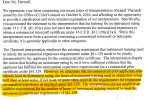what does it say about our system when CFIs have to parse legal interpretations?
I'm aware the interpretations exist, but I've never studied them in detail. Even here on this thread we have intelligent people who can't even agree what the interpretations mean. The only opinion that counts happens to be the DPE who is the gatekeeper.
I'm aware the interpretations exist, but I've never studied them in detail. Even here on this thread we have intelligent people who can't even agree what the interpretations mean. The only opinion that counts happens to be the DPE who is the gatekeeper.


